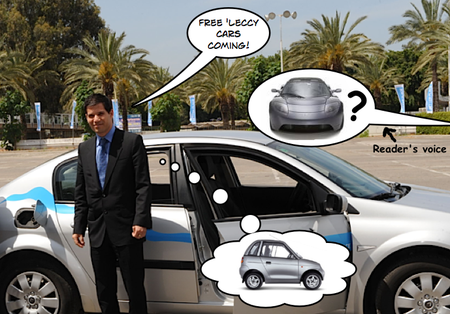Original URL: https://www.theregister.com/2008/11/11/agassi_free_car_forecast/
Agassi: free electric car, anyone?
Unlikely to be a Tesla
Posted in Science, 11th November 2008 15:15 GMT
'Leccy Tech Better Place CEO Shai Agassi has outlined his ideas for the electric car future, and the good news is that we all get free cars.
Well, up to a point. Agassi was elaborating on his 'leccy car as mobile phone' concept, according to which the consumer would purchase a contract for power and in return get a heavily subsidised car, possibly even a free one.
Interviewed for the Web 2.0 Summit, held in San Francisco, Agassi wasn't exactly clear on who would fund the freebie motors, but presumably he has the power companies in mind.
In terms of the recently announced Australian electric car infrastructure plan, this model would see AGL Energy, Better Place and Renault or Holden fulfilling a similar role in the electric car world that Vodafone, Carphone Warehouse and Nokia do in the mobile phone one.

A Better Place?
Agassi didn't say what the average consumer will pay for the monthly 'leccy allowance - or what they would get in return. Coughing up £50 a month and being handed the keys for a Tesla or Lightning would suit us just fine, but that's probably being a little optimistic.
However, Agassi did let slip that to qualify for a freebie you would probably need to be doing 20-25,000 miles per annum. So we'll be all be paying mileage-based tariffs in Agassi's vision of the future rather than per-month packages.
With the world's auto manufacturers not experiencing the best of times at the moment we aren't sure how they are going to react to the idea of giving cars away, though for them it shouldn't matter whether consumers buy their products or power companies do.
Agassi finished the interview by drawing a parallel with the way Detroit started with a clean product slate after building tanks for three years between 1942 and 1945, thus providing the foundation for the post-war American economic boom.
That's a fair point but it did require government action on a level that's hard if not impossible to envisage during peace time.
If legislative force is required to reduced the world's car-fuel consumption, simply banning engines above 1.6 litres from domestic vehicles would be a big start, but we don't see that happening either.